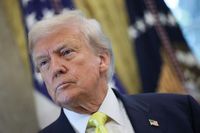Mexican President Claudia Sheinbaum, the country’s first female leader, marked her first year in office with a sweeping State of the Nation address on September 1, 2025, highlighting her administration’s progressive achievements, the challenges of U.S.-Mexico relations, and her steadfast defense of national sovereignty. Yet, as Sheinbaum celebrated economic and social gains, the specter of cartel violence and growing concerns over democratic backsliding loomed large—topics she largely sidestepped in her speech, even as they dominated international headlines and political discourse.
Sheinbaum’s presidency has unfolded against the backdrop of a turbulent global landscape and Mexico’s complex relationship with the United States. According to the Associated Press, she has enjoyed remarkable popularity, with approval ratings hovering between 70% and 80%, a testament to her ability to navigate both domestic expectations and external pressures. “Things are going well, and they’re only going to get better,” Sheinbaum assured the nation, setting an optimistic tone for her administration’s future.
Central to Sheinbaum’s address was the delicate balancing act with former U.S. President Donald Trump, who has repeatedly claimed that drug cartels wield enormous power in Mexico, even asserting that “Mexico is governed by criminal organizations.” In a recent interview with the Daily Caller, Trump praised Sheinbaum as “a terrific woman” and “actually an amazing woman in some ways. Very elegant, beautiful.” However, he doubled down on his assertion that “Mexico is run by the cartels. It’s run by the cartels.” Trump went further, claiming he had offered to send U.S. troops to Mexico to combat the cartels, but that Sheinbaum declined the offer “because she’s scared.”
Sheinbaum, for her part, has consistently rejected any notion of U.S. military intervention. As reported by the Latin Times, she stated unequivocally during her address, “Never. They might have the intent to do it, but we said no—not under that scheme.” Sheinbaum’s stance reflects a broader national sentiment: the memory of the 1846 U.S. invasion, which resulted in Mexico losing half its territory, still stirs strong feelings about sovereignty and foreign interference. “Under no circumstance will we accept interventions, interference, or any other act from abroad that is detrimental to the integrity, independence, and sovereignty of the country,” she declared, signaling a red line for her administration.
Nevertheless, Sheinbaum has shown a willingness to collaborate with the United States on security matters—on her own terms. As reported by Anadolu Agency, she told lawmakers, “The basis of this understanding is shared responsibility, mutual trust, respect for sovereignty and territoriality, and cooperation without subordination.” She emphasized Mexico’s openness to a new security agreement and trade talks, noting that the two countries were close to finalizing a new framework. U.S. Secretary of State Marco Rubio was scheduled to visit Mexico soon after her address, underscoring the urgency and importance of bilateral cooperation.
In response to U.S. pressure, Sheinbaum’s administration has taken tangible steps against organized crime. According to government data cited by the AP, Mexico extradited 26 suspected traffickers to the U.S. in August 2025, including figures tied to the notorious Sinaloa Cartel. In total, the government has delivered dozens of cartel figures long sought by U.S. authorities, a move widely interpreted as an attempt to stave off the threat of tariffs and further U.S. intervention. At the same time, Sheinbaum has insisted on respect for Mexican sovereignty, rebuffing Trump’s threats of military action and new tariffs designed to force Mexico’s hand on crime and migration.
Sheinbaum’s domestic agenda has been marked by ambitious social programs and a focus on economic growth. As she proudly announced, more than 8.3 million Mexicans were lifted out of poverty between 2022 and 2024, a feat largely attributed to expanded social programs and a higher minimum wage. Direct money transfers—including scholarships and payments to the elderly—now reach around 32 million families, or about a quarter of the nation’s population. “This is the most ambitious social plan in Mexico’s history,” she proclaimed, positioning her administration as a champion of the country’s most vulnerable.
Sheinbaum has also carried forward the legacy of her predecessor and political ally, Andrés Manuel López Obrador (AMLO), especially in infrastructure. Projects like the Maya Train remain central to her vision of national development. She pointed to a robust economy, noting growing investment and a strong peso, even as global markets remain volatile.
However, not all of Sheinbaum’s initiatives have been met with universal acclaim. One of the most contentious issues has been the overhaul of Mexico’s judicial system. As of September 1, 2025, a newly elected Supreme Court took office, following reforms pushed through by Sheinbaum’s Morena party. The changes, which allow for the popular election of judges, have sparked fears of eroding judicial independence and consolidating power within the ruling party. Critics argue that the move undermines checks and balances, making it easier for Morena to install loyalists in top judicial positions. Nevertheless, Sheinbaum defended the reforms, calling the new court a “profoundly democratic event” and declaring, “The era of nepotism, corruption and privilege is over, and a new era of legality and justice for all is beginning.”
Hugo Aguilar, a lawyer known for his work defending Indigenous rights and now president of the Supreme Court, echoed this sentiment during the inauguration ceremony. He pledged, “to give justice to those who have been excluded from the judicial apparatus.” The transition marks a significant chapter in Mexico’s legal history, though the long-term implications for democracy remain hotly debated.
Despite the administration’s efforts and positive economic indicators, Mexico continues to grapple with rampant cartel violence—a reality that Sheinbaum largely glossed over in her address. While she noted a dip in homicide rates, the ongoing bloodshed in regions like Sinaloa and the staggering number of missing persons (nearly 130,000) remain a source of national trauma. Trump and his allies have seized on this issue, with White House Deputy Chief of Staff Stephen Miller telling Fox News that “Mexico City is run by criminal cartels,” fueling concerns about the reach of organized crime and the effectiveness of government crackdowns.
For many Mexicans, the government’s claims of progress are difficult to reconcile with the daily realities of violence and impunity. While social programs and economic growth have improved millions of lives, the persistent threat of cartel activity and questions about the independence of the judiciary cast a long shadow over Sheinbaum’s first year in office.
As Sheinbaum looks ahead, she faces the daunting task of maintaining her administration’s popular support while addressing the country’s most urgent challenges. The coming months will test her ability to balance the demands of international diplomacy, domestic reform, and the unyielding pressure of Mexico’s security crisis.
For now, Sheinbaum’s message is one of cautious optimism and firm resolve—a promise that, despite the obstacles, Mexico’s future remains in Mexican hands.


